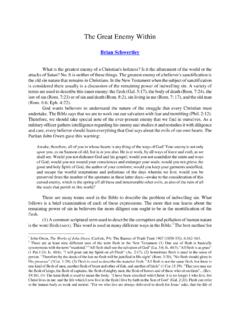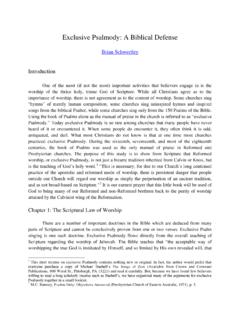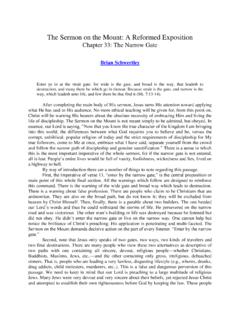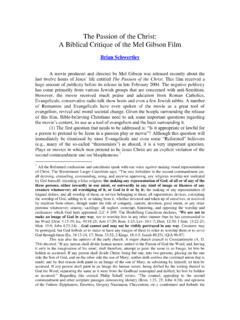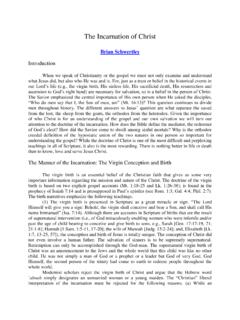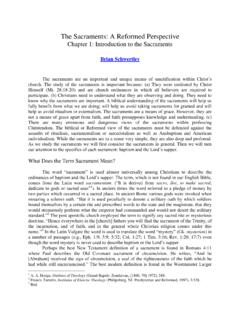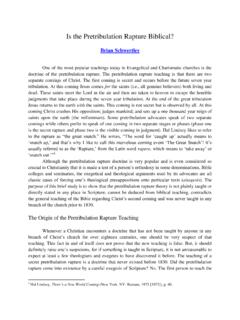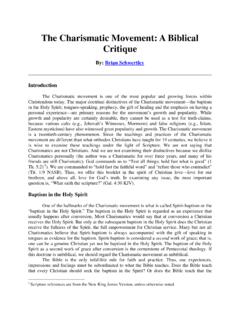Transcription of The Great Commission - Reformed Online
1 The Great Commission Brian Schwertley Introduction The Great Commission is one of the most referred to and preached upon portions of Scripture by Evangelical and Fundamentalist pastors and teachers today. Given the fact that the Great Commission contains Christ s marching orders for the church, this emphasis is warranted. What is unfortunate regarding this Evangelical emphasis is the fact that this portion of Scripture is almost always misinterpreted in a manner that severely limits the meaning and scope of the passage. Christ s command to disciple whole nations (which is a comprehensive task that aims at developing a worldwide Christian civilization and culture) has been completely ignored and replaced with a command to witness to individuals and wait for the rapture. The aim of this brief study will be to examine the Great Commission in order to expose some common erroneous usages of it and to determine its real meaning and significance for the church and the world.
2 Christ s Authority Then the eleven disciples went away into Galilee, to the mountain which Jesus had appointed for them. When they saw Him, they worshiped Him; but some doubted. And Jesus came and spoke to them, saying, All authority has been given to Me in heaven and on earth. Go therefore and make disciples of all the nations, baptizing them in the name of the Father and of the Son and of the Holy Spirit, teaching them to observe all things that I have commanded you; and lo, I am with you always, even to the end of the age. Amen (Mt. 28:16-20). When Jesus Christ gave orders to the eleven remaining apostles on a mountain in Galilee regarding the spiritual conquest of the whole earth, the first thing that He did was to declare the foundation for this mission. The imperatives of the Great Commission are based on the fact that Jesus Christ has received all authority. Christ s reception of all authority is emphasized in the original language.
3 The verb is in the emphatic position: Given to Me was all authority. When believers read that Jesus received all authority they often ask: If Jesus Christ is God how could he receive all authority? Didn t He already have infinite power? When discussing the humiliation and exaltation of Christ, one must keep in mind that we are discussing the divine-human Mediator. Christ s humiliation consists of laying aside the divine majesty; assuming a human nature (body and soul); coming in the form of a servant; and subjecting Himself to the demands and curse of the law (Gal. 4:4). Berkhof writes, On the basis of the passage in Philippians [2:7, 8] it may be said that the essential and central element in the state of humiliation is found in the fact that He who was the Lord of all the earth, the supreme Lawgiver, placed Himself under the Law, in order to discharge its federal (covenant) and penal obligations in behalf of His people.
4 By doing this He became legally responsible for our sins and liable to the curse of the law. 1 After Jesus Christ the Mediator and federal head of His people merited eternal life (by perfectly obeying the law and by taking on Himself the full penalty for the guilt of sin at the cross) He received exaltation. His exaltation is the reward for His perfect obedience. It is the judicial result of the state of humiliation. 2 Because of Adam s fall, Jesus (in order to save the elect) needed to assume a human nature, pay the penalty, and earn the reward as a real man, the second Adam. Judicially He was the covenant head of all the elect. Thus, Christ is referred to in Scripture as: the first fruits of them who have fallen asleep (1 Cor. 15:20); the first among many brethren (Rom. 8:29); the firstborn from the dead (Col. 1:18). As the Mediator, Jesus secured a judicial re-creation. Christ s resurrection and exaltation is a judicial declaration by the Father of a perfectly achieved salvation by the Son.
5 Therefore, although as God Jesus already had all power and authority (metaphysically), as the divine-human Mediator He received all power and authority to complete His judicial mission of taking the elect unto glory. As the pre-incarnate Son He created the earth and as the mediator He created the church (Col. 1:15-22). In the Great Commission the claim of Christ to have received from God all authority in heaven and on earth formalizes judicially what was already true metaphysically: God s rulership over all. 3 There are five things that one should know regarding Christ s authority: (1) Jesus Christ was given all authority by God the Father. Jesus spoke these words, lifted up His eyes to heaven, and said: Father, the hour has come. Glorify Your Son, that Your Son also may glorify You, as You have given Him authority over all flesh, that He should give eternal life to as many as You have given Him.
6 And this is eternal life, that they may know You, the only true God, and Jesus Christ whom You have sent. I have glorified You on the earth. I have finished the work which You have given Me to do. And now, Father, glorify Me together with Yourself, with the glory which I had with You before the world was (Jn. 17:1-5). Before the creation of the world the Father, the Son and the Holy Spirit entered into a voluntary agreement regarding the salvation of the elect. God the Father sent the Son into the world to save those He had chosen. The Son came into the world to do the Father s will; Jesus Christ lived a sinless life and died a sacrificial death on behalf of the chosen. The Holy Spirit was sent by the Father and the son to apply redemption to God s people. [I]n the economy of redemption there is in a sense, a division of labor: the Father is the originator, the Son the executor, and the Holy Spirit the applier.
7 4 After Jesus had successfully fulfilled His mission He was exalted by the Father. Peter said: This Jesus God has raised all the house of Israel know assuredly that 1 L. Berkhof, Systematic Theology (Grand Rapids, MI: Eerdmans, 1939), 2 Ibid, p. 345. 3 Kenneth L. Gentry, Jr., The Greatness of the Great Commission (Tyler, TX: Institute for Christian Economics, 1990), p. 42. 4 L. Berkhof, Systematic Theology, p. 266. God has made this Jesus, whom you crucified, both Lord and Christ (Acts 2:32, 36). He humbled Himself and became obedient to the point of death, even the death of the cross. Therefore God also has highly exalted Him and given Him the name which is above every name (Phil. 2:8-9). (2) Jesus received His authority as a reward for His redemptive obedience. Jesus came to do the Father s will. Did you not know that I must be about My Father s business?
8 (Lu. 2:49). Behold I have do Your will, O God (Heb. 10:7). Jesus said to His disciples: My food is to do the will of the Him who sent Me, and to finish His work (Jn. 4:34). Thus at the close of His earthly ministry Jesus said, I have finished the work which You gave Me to do (Jn. 17:4). Immediately before Jesus died on the cross He cried out, It is finished (Jn 19:10). Jesus earned His glorification by perfectly fulfilling His redemptive mission. This mission was two-fold. As the second Adam He had to fulfill the covenant of works by living His whole life in perfect obedience to God s law. He also had to suffer and die as a blood sacrifice for His people (the elect). Jesus came to fulfill all righteousness (Mt. 3:15). He was the sinless, spotless lamb of God who takes away the sin of the world (Jn. 1:29). Jesus came to make an end of sins, to make reconciliation for iniquity, to bring in everlasting righteousness (Dan 9:24).
9 He having offered one sacrifice for sins for all time sat down at the right hand of God (Heb. 10:12). The sinless life of the Son of God and the shedding of His precious blood is why Jesus was glorified. His redemptive work made the Great Commission possible and a reality. Christ s total authority and the Great Commission which flows from that authority is founded upon Christ s victory at the cross. There was every reason then why He should be glorified .. Having endured the Cross, He was fully entitled to enter the joy set before Him. Having poured out His soul unto death, it was meet that the Father should divide him a portion with the Great (Isa. 53:12). 5 (3) Jesus received His authority when He rose from the dead. The verb was given in the original language indicates that at a single point of time in the past Christ received all authority. Since the Great Commission was spoken to the apostles before the ascension, the logical point of time in which all authority was bestowed was during or immediately after the resurrection.
10 Paul said that Jesus was declared to be the Son of God with power, according to the Spirit of holiness, by the resurrection from the dead (Rom. 1:4). The resurrection of Christ is the turning point of His ministry and of all human history. When Jesus was dead in the tomb He was still in a state of humiliation but the moment He rose He entered into His exaltation and reward. The prophet Daniel had a vision in which he saw the ascension of Christ and His enthronement by the Father. I kept looking in the night visions, and behold, with the clouds of heaven One like a Son of Man was coming, and He came up with the Ancient of days, and was presented before Him. And to Him was given dominion, glory and a kingdom, that all the 5 A. W. Pink, Exposition of the Gospel John (Grand Rapids, MI: Zondervan, 1975 [1945]), part 3, p. 104. peoples, nations, and men of every language might serve Him.
